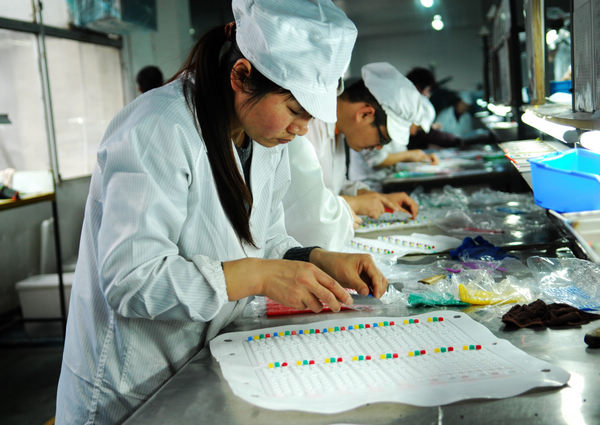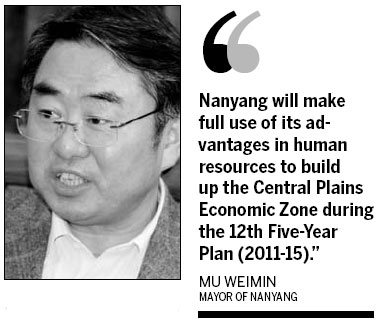No place like home for former migrants
Updated: 2012-03-12 08:03
By An Baijie and Shi Baoyin (China Daily)
|
||||||||
Job opportunities grow in inland regions as plants move from coast
Thanks to a new factory in Tanghe county in Central China's Henan province, the 1,400-km journey to find work in the country's industrialized coastal region is a thing of the past for villager Zhang Fei.
Zhang, 19, from Chengguan district of Tanghe, has been working in an electronics factory near her hometown in the rural region since early last month.
|
 |
|
Workers on the assembly line of a factory in Tanghe county, Henan province, on March 8. Thanks to the preferable policies offered to companies doing business in Tanghe county, an increasing number of high-tech companies have moved their manufacturing facilities to the county, creating more jobs for local people. [Xiang Mingchao / China Daily] |
The factory, which moved from Shenzhen in South China's Guangdong province last April, produces electronic sensors that are widely used in products including iPhones, iPads, MP3 players and mobile phones.
Zhang's job is to feed thin copper line, thin as a hair, through a machine with a small groove, and then roll it to produce a copper coil.
She gets paid 0.01 yuan (0.16 cents) per copper coil, which takes about 10 seconds to make. Working a nine-hour shift, she can earn about 2,000 yuan ($316) per month.
|
 |
Last year, she traveled more than 1,400 km to work at a metal tools factory in Dongguan, Guangdong province. She could earn about 3,000 yuan per month there, pasting metal components with industrial glues.
Even though migrating to work in South China could bring her higher wages, Zhang said that she could save little there because she had to pay rent and also spent a lot of money on after-work entertainment.
"Now I can save more money than last year because I don't have to pay rent, as I live with my parents," she said.
"And there are not so many entertainment venues in the rural region near the factory, which also helps me save money."
Migrating to the coastal region, she was homesick from time to time, and last year, she could only meet her parents for several days during the Spring Festival, because she was too busy and the trip from Guangdong to her hometown cost more than 1,000 yuan, which was "unaffordable".
"My parents prefer me to work in my hometown than thousands of kilometers away," she said. "I am the only child in my family and I want to be with my parents as much as possible."
Factories going inland
There are more than 400 workers - mostly like Zhang from local villages - at Honglida Electronic Technology Co, which is based in a suburban region of Tanghe county.
Che Xiaojuan, a manager at Honglida, said workers in inland areas ask for lower wages and work harder.
"When our company was based in Shenzhen, we had to pay workers an average monthly salary of 3,500 yuan, but after moving to Tanghe county in Henan last year, we pay the workers about 2,400 yuan at most," Che said.
"It's a win-win situation not only for the company but also for the workers, who can find a job near their hometowns," the manager said.
More than 120 companies have set up operations in the county's industrial district since the provincial government's plan to build the Central Plains Economic Zone was approved by the State Council last year, said Zhao Yang, head of Tanghe county's publicity department.
"Most of the companies are manufacturing firms which need to hire a large number of workers," he said. "Tens of thousands of local residents have found jobs near their home after so many factories moved here."
Li Xiangjun, 37, a resident of Tanghe county, said that he could take better care of his 68-year-old mother and 11-year-old son while working in a factory near his hometown.
From 2004 to 2010, Li worked for a computer company in Zhongshan, Guangdong province, where he could earn about 3,000 yuan per month.
He had to return home in September 2010 when his mother was diagnosed with high blood pressure and arthritis, and his son's studies were also influenced due to Li's long separation from his family.
He managed to find a job in a factory near his home making model airplanes, where he earns about 2,000 yuan a month.
"Even though working here brings me less money than working in Guangdong province, I feel happier now because I can see the smiles of my mum and son every day," Li said.
Favorable policies
The local government offers favorable policies to encourage companies to move from the coast to the inland region, said Mu Weimin, mayor of Nanyang, which administers Tanghe county.
The Nanyang government plans to establish a "highland for opening-up in the inland region", which aims to attract more companies to move their factories to Nanyang to create as many job opportunities as possible, Mu said.
Nanyang, with a population of more than 10.85 million, is the largest city in Henan province. More than 70 percent of its residents live in the rural region and have become the main source of labor for the manufacturing companies moving to the area.
"Nanyang will make full use of its advantages in human resources to build up the Central Plains Economic Zone during the 12th Five-Year Plan (2011-15)," the mayor said.
Foxconn Technology Group, which assembles iPhones in China, is going to establish a factory in Nanyang to produce LED screens and lamps, with a projected annual output of 300,000 sets of LED lamps, Mu said.
Given the fact that many villagers lack the skills needed by modern manufacturing companies, the local government is actively seeking ways to provide training, said the mayor.
"There are a total of 116 vocational training agencies in Nanyang, including universities, colleges and vocational schools," Mu said. "Apart from the efforts made by the government, the companies have also been providing training."
Zhao Youfa, trade union chairman at Rizhixin Silicon Rubber Electronic Co in Tanghe county, said that with the rapid development of the company in recent years, there is a growing demand for experienced workers.
The company, which produces remote-control keyboards for both domestic and overseas clients, has more than 700 workers. Around 170 of them are skilled workers who have been with the company for more than five years, according to Zhao.
Describing skilled workers as "treasures" of the company, Zhao said that it offered a 500 yuan bonus to employees who have worked there for more than five years.
Wang Lang, 22, a worker at Rizhixin with a monthly salary of around 2,000 yuan, said that he hoped to get as many skills as possible to make himself more competitive in the labor market.
"What I do every day in the factory is to repeatedly paste rubber buttons to remote control keyboards, and I don't know what else I am able to do other than this," he told China Daily. "I do hope to get more skills to meet the requirements of modern companies."
|
REPORTER'S LOG An Baijie Employee welfare rises up corporate agenda Editor's note: China Daily reporter An Baijie visited several factories in Tanghe county of Nanyang, Henan province. The factories, mostly coming from coastal regions, have not only brought more work to the inland area, but also more respectful attitudes toward workers. In the "industrial cluster district" of Tanghe county, where more than 120 factories are densely located, lots of big bulletin boards with recruitment ads can easily be found outside the factories' gates. The ads, mostly printed with eye-catching characters, promise attractive rewards - high salaries, multiple subsidies, and sufficient holidays - to their potential employees. "Each of our workers could get a minimum payment of 1,400 yuan ($221.90) per month, and a 200 yuan food subsidy. The company provides free dormitories for those whose homes are far away," reads one of the company's ads. A senior manager from an electronics factory said that companies are paying much more attention to the welfare of their workers nowadays. Unlike their parents, who seldom have any requirements other than sufficient payment, the new generation of workers, especially those born in the 1990s, are seeking more rights from their employers. An 18-year-old female worker who has worked less than two months for an electronics company complained that the factory's cafeteria was not as good as she wished. "The dishes are usually too salty, and I miss the food cooked by my mum," she said. "My friend told me that the cafeteria at another factory is better, and I plan to go there if our cafeteria is not improved." A 22-year-old employee said that he hoped to sing karaoke after finishing work, but there are no karaoke lounges in the vast industrial park. "I miss the time last year when I worked in a factory in Dongguan in Guangdong province. The entertainment industry is thriving there, and I could relax by singing karaoke or dancing," he said. To better meet the demands of younger workers, a company manager plans to set up an entertainment venue in the factory, where the workers can play basketball, table tennis, badminton, video games, and watch movies. "The company has no other choice but to satisfy its employees or they will vote with their feet and go to other factories," said the manager. "The time when the company could make profits by cutting the welfare of employees has passed forever," the manager said. |
You may contact the writers at anbaijie@chinadaily.com.cn and shibaoyin@chinadaily.com.cn.
Xiang Mingchao and Zhang Leilong contributed to this story.

 Relief reaches isolated village
Relief reaches isolated village
 Rainfall poses new threats to quake-hit region
Rainfall poses new threats to quake-hit region
 Funerals begin for Boston bombing victims
Funerals begin for Boston bombing victims
 Quake takeaway from China's Air Force
Quake takeaway from China's Air Force
 Obama celebrates young inventors at science fair
Obama celebrates young inventors at science fair
 Earth Day marked around the world
Earth Day marked around the world
 Volunteer team helping students find sense of normalcy
Volunteer team helping students find sense of normalcy
 Ethnic groups quick to join rescue efforts
Ethnic groups quick to join rescue efforts
Most Viewed
Editor's Picks

|

|

|

|

|

|
Today's Top News
Health new priority for quake zone
Xi meets US top military officer
Japan's boats driven out of Diaoyu
China mulls online shopping legislation
Bird flu death toll rises to 22
Putin appoints new ambassador to China
Japanese ships blocked from Diaoyu Islands
Inspired by Guan, more Chinese pick up golf
US Weekly

|

|







